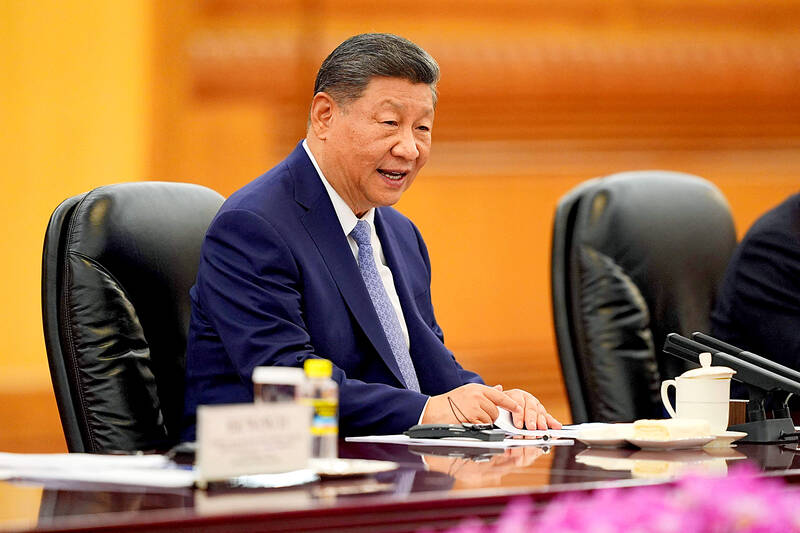The Chinese Communist Party is today to begin four days of key closed-door discussions, formulating core economic strategy for coming years as growth flags and trade headwinds mount.
The gathering of the Central Committee would be crucial in determining policy objectives in the world’s second-largest economy.
Foreign media access to attending officials is highly restricted during the event, which typically opens and closes in Beijing’s Great Hall of the People.

Photo: AFP
The session would focus on proposals for the 15th five-year plan on economic and social development, state media said.
That plan, which covers the period from next year until 2030, would play a central role in the pursuit of Chinese President Xi Jinping’s (習近平) core aims, including technological self-sufficiency, and military and economic might.
The plenum is scheduled to conclude on Thursday, after which authorities are expected to release a summary of major outcomes.
This month’s meeting comes at an uncertain time for the Chinese economy, beset by sluggish domestic spending, a protracted crisis in the property sector and a turbulent trade war with the US.
“While plenums generally attract less attention than other political events, it is during those plenums that major policies are discussed and being decided upon,” Rabobank senior China economist Teeuwe Mevissen said. “Given the sheer size of China’s economy, these decisions also impact the rest of the world.”
Typically, it is at the fifth plenum that officials chart the next five-year economic blueprint, but after an unexplained nine-month delay to the third plenum until July last year, that monumental task is now expected to fall on the upcoming conclave.
Experts have said that China must shift toward an economic model propelled more by domestic consumption as opposed to infrastructure investment and exports — long key drivers of growth.
Household demand has been sluggish, with official data showing that consumer prices fell again last month after reaching a half-year low in August.
Another prominent issue officials would likely be seeking to address at the plenum is industrial overcapacity, causing domestic gluts of cheap goods in certain sectors and exacerbating friction with trading partners.
Authorities are also due to announce closely watched economic figures for the third quarter.
Analysts forecast the data to show overall growth during the July-to-September period of 4.8 percent — the slowest in a year.

FOUR DESIGNATED AREAS: Notices were issued for live-fire exercises in waters south and northwest of Penghu, northeast of Keelung and west of Kaohsiung, they said The military is planning three major annual exercises across the army, navy and air force this month, with the navy’s “Hai Chiang” (海強, “Sea Strong”) drills running from today through Friday, the Ministry of National Defense said yesterday. The Hai Chiang exercise, which is to take place in waters surrounding Taiwan, would feature P-3C Orion maritime patrol aircraft and S-70C anti-submarine helicopters, the ministry said, adding that the drills aim to bolster the nation’s offshore defensive capabilities. China has intensified military and psychological pressure against Taiwan, repeatedly sending warplanes and vessels into areas near the nation’s air defense identification zone and across

FORCED LABOR: A US court listed three Taiwanese and nine firms based in Taiwan in its indictment, with eight of the companies registered at the same address Nine companies registered in Taiwan, as well as three Taiwanese, on Tuesday were named by the US Department of the Treasury’s Office of Foreign Assets Control (OFAC) as Specially Designated Nationals (SDNs) as a result of a US federal court indictment. The indictment unsealed at the federal court in Brooklyn, New York, said that Chen Zhi (陳志), a dual Cambodian-British national, is being indicted for fraud conspiracy, money laundering and overseeing Prince Holding Group’s forced-labor scam camps in Cambodia. At its peak, the company allegedly made US$30 million per day, court documents showed. The US government has seized Chen’s noncustodial wallet, which contains

SUPPLY CHAIN: Taiwan’s advantages in the drone industry include rapid production capacity that is independent of Chinese-made parts, the economic ministry said The Executive Yuan yesterday approved plans to invest NT$44.2 billion (US$1.44 billion) into domestic production of uncrewed aerial vehicles over the next six years, bringing Taiwan’s output value to more than NT$40 billion by 2030 and making the nation Asia’s democratic hub for the drone supply chain. The proposed budget has NT$33.8 billion in new allocations and NT$10.43 billion in existing funds, the Ministry of Economic Affairs said. Under the new development program, the public sector would purchase nearly 100,000 drones, of which 50,898 would be for civil and government use, while 48,750 would be for national defense, it said. The Ministry of

SENATE RECOMMENDATION: The National Defense Authorization Act encourages the US secretary of defense to invite Taiwan’s navy to participate in the exercises in Hawaii The US Senate on Thursday last week passed the National Defense Authorization Act (NDAA) for Fiscal Year 2026, which strongly encourages the US secretary of defense to invite Taiwan’s naval forces to participate in the Rim of the Pacific (RIMPAC) exercise, as well as allocating military aid of US$1 billion for Taiwan. The bill, which authorizes appropriations for the military activities of the US Department of Defense, military construction and other purposes, passed with 77 votes in support and 20 against. While the NDAA authorizes about US$925 billion of defense spending, the Central News Agency yesterday reported that an aide of US